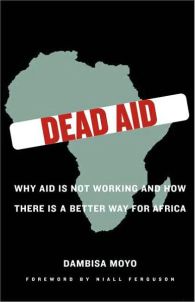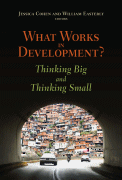Re Ian Bremmer 'Could third-party candidates upend the 2024 US election?' 3 April The current political movement in the USA…
Aid, development and progress 2010
Written by Diana Thebaud Nicholson // December 27, 2010 // Africa, Aid & Development // Comments Off on Aid, development and progress 2010
Haitian leader says reconstruction is flagging
The international community, by channeling aid money into Haiti through outside nongovernmental organizations, is not permitting Haitians to play a big enough role in the reconstruction of their own country, according to Prime Minister Jean-Max Bellerive. Consequently, he said, only some 20% of all aid pledged for rebuilding has been received. BBC (12/27)
22 December
African Farmers Displaced as Investors Move In
Across Africa and the developing world, a new global land rush is gobbling up large expanses of arable land. Despite their ageless traditions, stunned villagers are discovering that African governments typically own their land and have been leasing it, often at bargain prices, to private investors and foreign governments for decades to come.
Organizations like the United Nations and the World Bank say the practice, if done equitably, could help feed the growing global population by introducing large-scale commercial farming to places without it.
But others condemn the deals as neocolonial land grabs that destroy villages, uproot tens of thousands of farmers and create a volatile mass of landless poor. Making matters worse, they contend, much of the food is bound for wealthier nations.
… a $224 million American project will help about 800 Malian farmers each acquire title to 12 acres of newly cleared land, protecting them against being kicked off.
Jon C. Anderson, the project director, argued that no country has developed economically with a large percentage of its population on farms. Small farmers with titles will either succeed or have to sell the land to finance another life, he said, though critics have said villagers will still be displaced.
Extreme poverty abides in rural areas
Over the past decade, about 350 million people left the ranks of extreme poverty, but more than a billion continue to subsist on less than $1.25 per day, according to a UN report. About 70% of the world’s poorest people are rural dwellers, per the Rural Poverty Report from the International Fund for Agricultural Development. BBC (12/6)
27 November
La finance au secours d’Haïti
(La Presse) Montréalaise d’origine haïtienne, Katleen Felix poursuivait une belle carrière à Wall Street avant de tout plaquer pour aider le pays de ses parents. À la veille des élections présidentielles haïtiennes, cette apôtre de la micro-finance sert un avertissement: «en Haïti, il n’y aura pas de démocratie politique sans démocratie financière».
16 November
 Learning and Leadership: Two Main Ingredients for Africa’s Development
Learning and Leadership: Two Main Ingredients for Africa’s Development
(OECD Insights) Government, civil society and international organisations met in Tunis this month to discuss the priorities for aid and development effectiveness ahead of the High Level Forum on Aid Effectiveness in Busan, Korea in November 2011. Misaki Kruger of the OECD Development Co-operation Directorate reports.
What Africa needs is not only cash, but practical and innovative ideas to “put Africa to work”. Kenyan Minister of State for Public Service, Dalmas Anyango Otieno, set the tone of the meeting – looking for ways to build capable and effective states that can maximise all resources and knowledge.
So what are the main ingredients needed to make this happen?
22 October
Chinese Aid Bringing Smiles to Sierra Leone Farmers
(IPS) – “I think I am successful now,” says Fanta Jabbah. “I am able to take care of my three children and support my husband; now I have a say in my household.”
Jabbah is the chair of a 26-member organisation of farmers in Lumley, just outside the Sierra Leonean capital, Freetown. With support from the Wuhan Municipal Foreign Co-operation (WMFC), she has gone from growing food just to feed her family, to a farmer who sold rice to the government to support farmers in other parts of the country.
The WMFC is a Chinese government aid project which is improving the agricultural output of groups like Jabbah’s in Freetown, as well as others around the cities of Bo and Kenema. The project has provided hybrid rice and fertiliser, as well as access to power tillers, combined harvesters and a rice mill.
4 October
Swapping Pirates for Commerce
(Foreign Affairs) A new U.S. emphasis on African maritime development — dedicated not only to rooting out piracy but also renovating ports and investing in job creation — could improve African security and economic growth.
The African maritime sector, ridden with piracy on its eastern and western seaboards, plays a largely unheralded but critical role in the attempt of African states to emerge onto the global market. A new U.S. emphasis on African maritime development — dedicated not only to rooting out piracy and preventing transport of narcotics and weapons but also renovating ports, streamlining maritime bureaucracies, and investing in businesses and job creation — could serve as a bold effort to implement the president’s development strategy. To that end, and to support ongoing military and diplomatic efforts to counter piracy and other crimes at sea, the administration should develop a signature program geared toward growing (and revolutionizing) Africa’s maritime sector.
Ban urges shift in Africa partnerships
United Nations Secretary-General Ban Ki-moon says the time is right for a shift away from aid for Africa toward investments and partnerships. Inflation is falling across the continent and political stability is increasing, Ban told the Gabon parliament. Google/Agence France-Presse (7/1)
UN report identifies problems with Somalia aid
United Nations Secretary-General Ban Ki-moon should open an investigation into the distribution of food aid intended for civilian populations affected by violence in Somalia, a new Security Council report recommends. Contractors, local UN staff and Islamic militants are diverting as much as half of the aid and the entire aid system for Somalia need to be redesigned, the report says. The New York Times (free registration) (3/9) Contractors ‘divert Somalia aid’ (BBC)
G-20 critics look for a seat at the table
A coalition of NGOs, student groups and labor unions are looking to increase the effectiveness of delivering their message of support for increased development aid to the G-20 when it meets in Canada in June. Instead of planning protests outside the events, coalition members are asking for credentials to attend the event. Other groups are still planning to have presence outside. The Globe and Mail (Toronto) (3/9)
Can targeted development success be replicated?
A massive influx of development aid under a project created by Columbia University economist Jeffrey Sachs is rapidly transforming the economic prospects of 80 Millennium Villages by targeting assistance toward education and training of locals. The question is whether the gains can be replicated on a significantly larger scale in a bid tackle global poverty levels. The New York Times (free registration) (3/8)
2 March
Nicholas Kristof: Does Haiti’s Earthquake Hurt Cambodia?
The silver lining to a tragedy like the Haiti earthquake is that it gets Americans focused on that country’s problems and reaching into their pockets to try to help. We may ignore Haiti’s day-to-day needs, but after the earthquake the outpouring truly was magnificent. There is some risk, though, that that outpouring leads to less money going to the day-to-day needs in other countries.
1 March
Haitians find income, emotional relief in cash-for-work project
To its detractors, cash-for-work is glorified street sweeping — a small-scale, feel-good scheme that helps deflect attention from how poorly the U.N. is doing with bigger, more consequential jobs like getting displaced Haitians decent shelter and sanitation facilities. But its backers say the program bears the seeds not only of a more effective rebuilding effort in Haiti, but of a new development strategy that’s less about top-down, welfare-style aid and more about economy-stimulating engagement of the grassroots.
 Banned Aid – Why International Assistance Does Not Alleviate Poverty
Banned Aid – Why International Assistance Does Not Alleviate Poverty
(Foreign Affairs Jan/Feb 2010) If history is any guide, therefore, the chief weapon in the “war on poverty” should be not aid but liberal policy reforms. Aid may assist poor nations if it is effectively tied to the adoption of sound development policies and carefully channeled to countries that are prepared to use it properly (as President George W. Bush’s Millennium Challenge program recently sought to do). Political reform is important, too, as has been recognized by the enlightened African leaders who have put their energies into the New Partnership for Africa’s Development (NEPAD), which aims to check the continent’s worst political abuses.
But unfortunately, despite all these good intentions, if the conditions for aid’s proper use do not prevail, that aid is more likely to harm than help the world’s poorest nations. This has been true in the past, it is true now, and it will continue to be true in the future — especially if some activists get their wishes and major new flows of aid reach the developing world simply because it makes Western donors feel good.
Moyo is right to raise her voice, and she should be heard if African nations and other poor countries are to move in the right direction. In part, that depends on whether the international development agenda is set by Hollywood actresses and globetrotting troubadours or by policymakers and academics with half a century of hard-earned experience and scholarship. In the end, however, it will be the citizens and policymakers of the developing world who will seize the reins and make the choices that shape their destiny and, hopefully, soon achieve the development progress that so many have sought for so long.
When the current crisis [in Haiti] has subsided, this comment, posted on CBC is well worth debating:
Funding is too far spread to too many different agencies to actually change things. I realize that each agency has their own mandate and they try to work together to not double efforts. But since 1995 billions have been donated. Personnel from around the world have been tasked with rebuilding Haiti after disasters, coups. Things have not changed that much. They need housing, they need food- fresh water, medical supplies and more. UN Peacekeepers including CF Soldiers and humanitarian aid has spent time, money to no real change. We need to look at long term and in my opinion once the basics have been restored, they need industry the most. Lets get coordinated, each one of these different aid groups have administrative-transportation-advertisement costs that take away from the donations that actually get into the hands that need it. Why can’t these groups fall under one single umbrella one administrative team that supports those groups that help school, others for medical, others for housing and so on. Once that is back in place, then we look at building their industrial side, that creates international trade, which puts money into their pockets. Let’s help them to support themselves, instead of feeding symptoms. Like I said earlier, they need aid now to help them recover but let’s do this in the most cost effective way to benefit the majority as quickly as possible. Then let’s not turn our backs and say we did a good job, it’s not over – we need to help them stay on their feet by building industry to keep them there.
31 January
Haiti Is Again a Canvas for Approaches to Aid
The fact that Haiti was mired in dysfunction well before the earthquake, despite having received more than $5 billion in aid over about two decades, is fueling a contentious debate on whether a grand reconstruction plan can finally fix the country or would be doomed to repeat previous failures.
One side argues that Haiti should be temporarily taken over by an international organization, which would govern it and oversee its rebuilding. On the other extreme, minimalists fervently believe that years of failed, foreign-imposed aid projects underscore that this time Haitians need to develop and implement their own plans.
And in between are those who argue for a joint Haitian-international reconstruction agency to administer a kind of Marshall Plan.
26 January
Jeffrey Sachs, Katleen Félix, et.al., International Donors Face Quandary in Haiti
Gazette: Chalmers Larose, a Université du Québec à Montréal professor of political science, said in an interview that Canada’s Haitian community has been pushing the federal and Quebec governments for a work-furlough program that would see Haitian ex-pats loaned back to Haiti, to help strengthen its civil society. According to such a program, the two levels of governments would agree to paid leaves of absence for managers of Haitian origin.
25 January
Aid reality a report by Adrienne Arsenault for CBC
23 January
Editorial Growth of aid and the decline of humanitarianism
(The Lancet) Large aid agencies and humanitarian organisations are often highly competitive with each other. Polluted by the internal power politics and the unsavoury characteristics seen in many big corporations, large aid agencies can be obsessed with raising money through their own appeal efforts. Media coverage as an end in itself is too often an aim of their activities. Marketing and branding have too high a profile. Perhaps worst of all, relief efforts in the field are sometimes competitive with little collaboration between agencies, including smaller, grass-roots charities that may have better networks in affected counties and so are well placed to immediately implement emergency relief. … Given the ongoing crisis in Haiti, it may seem unpalatable to scrutinise and criticise the motives and activities of humanitarian organisations. But just like any other industry, the aid industry must be examined, not just financially as is current practice, but also in how it operates from headquarter level to field level… Although many aid agencies do important work, humanitarianism is no longer the ethos for many organisations within the aid industry. For the people of Haiti and those living in parallel situations of destruction, humanitarianism remains the most crucial motivation and means for intervention.”
19 January
An Open Letter to David Brooks on Haiti
Today, Haiti is virtually destroyed. The earthquake having done the hard part, Mr. Brooks, you think “intrusive paternalism” will save it. Lacking a foundational understanding of Haitian history and culture, and bearing the familiar colors of American imperialism, you and your ilk will do vastly more harm than good.
17 January
Small aid agencies have a vital role
(Independent) The key for small agencies … is to “Start very small. Employ and engage as many local people as you can, so you know from their responses that what you are doing is useful. But look over their shoulders, too, because the people who turn up to offer advice, and to be helped, may not be the people who are most in need. Coordinate with other agencies to make sure you are not duplicating tasks being done by others. In Haiti the demands of the immediate rescue and relief effort stare the world in the face, but an organisation that wants to make itself useful has to think long-term.”
U.S. considers its ongoing role in rebuilding Haiti: Striking the correct balance between completely taking over the administration of Haiti and allowing the disaster to fall to neglect once it leaves the news cycle will be a principal challenge facing U.S. President Barack Obama as the administration struggles to provide assistance to the devastated state at a time when its foreign policy commitments already are exacting. Experts have asked whether any entity other than the U.S. is capable of extending order to a virtually destroyed Port-au-Prince. The New York Times (1/17)
15 January
David Brooks: The Underlying Tragedy
… This is a poverty story. It’s a story about poorly constructed buildings, bad infrastructure and terrible public services. On Thursday, President Obama told the people of Haiti: “You will not be forsaken; you will not be forgotten.” If he is going to remain faithful to that vow then he is going to have to use this tragedy as an occasion to rethink our approach to global poverty. He’s going to have to acknowledge a few difficult truths.
The first of those truths is that we don’t know how to use aid to reduce poverty. Over the past few decades, the world has spent trillions of dollars to generate growth in the developing world. …
In the recent anthology “What Works in Development?,” a group of economists try to sort out what we’ve learned. The picture is grim. There are no policy levers that consistently correlate to increased growth. There is nearly zero correlation between how a developing economy does one decade and how it does the next. There is no consistently proven way to reduce corruption. Even improving governing institutions doesn’t seem to produce the expected results.
The chastened tone of these essays is captured by the economist Abhijit Banerjee: “It is not clear to us that the best way to get growth is to do growth policy of any form. Perhaps making growth happen is ultimately beyond our control.”
The second hard truth is that micro-aid is vital but insufficient. …
Third, it is time to put the thorny issue of culture at the center of efforts to tackle global poverty. Why is Haiti so poor? Well, it has a history of oppression, slavery and colonialism. … As Lawrence E. Harrison explained in his book “The Central Liberal Truth: How Politics Can Change a Culture and Save It from Itself”, Haiti, like most of the world’s poorest nations, suffers from a complex web of progress-resistant cultural influences. There is the influence of the voodoo religion, which spreads the message that life is capricious and planning futile. There are high levels of social mistrust. We’re all supposed to politely respect each other’s cultures. But some cultures are more progress-resistant than others, and a horrible tragedy was just exacerbated by one of them.
Fourth, it’s time to promote locally led paternalism. In this country, we first tried to tackle poverty by throwing money at it, just as we did abroad. Then we tried microcommunity efforts, just as we did abroad. But the programs that really work involve intrusive paternalism.
These programs, like the Harlem Children’s Zone and the No Excuses schools, are led by people who figure they don’t understand all the factors that have contributed to poverty, but they don’t care. … This earthquake is certainly a trauma. The only question is whether the outside world continues with the same old, same old.
 What Works in Development? Thinking Big and Thinking Small – the book
What Works in Development? Thinking Big and Thinking Small – the book
What Works in Development? brings together leading experts to address one of the most basic yet vexing issues in development: what do we really know about what works — and what doesn’t — in fighting global poverty?
The contributors, including many of the world’s most respected economic development analysts, focus on the ongoing debate over which paths to development truly maximize results. Should we emphasize a big-picture approach — focusing on the role of institutions, macroeconomic policies, growth strategies, and other country-level factors? Or is a more grassroots approach the way to go, with the focus on particular microeconomic interventions such as conditional cash transfers, bed nets, and other microlevel improvements in service delivery on the ground? The book attempts to find a consensus on which approach is likely to be more effective.
May 2008 – the conference
What Works in Development? Thinking Big and Thinking Small
The conference focused on the ongoing debate over which paths to development really maximize results: a big-picture approach focusing on the role of institutions, macroeconomic policies, growth strategies and other country-level factors; or a more grassroots approach focusing on particular microeconomic interventions such as conditional cash transfers, bed nets, teaching materials and other micro-level improvements in service delivery on the ground. The conference objective was to shed light on both schools of thought, with the goal of achieving a consensus on how to best leverage limited resources and time in the race to lift the lives of the world’s poorest.



